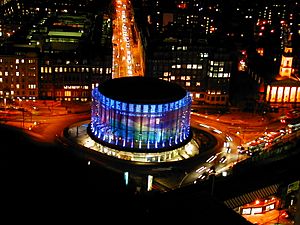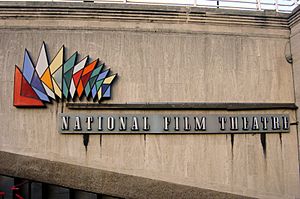British Film Institute facts for kids
 |
|
| Abbreviation | BFI |
|---|---|
| Predecessor | UK Film Council |
| Formation | 1933 |
| Type | Film, television charitable organisation |
| Headquarters | 21 Stephen Street, London, United Kingdom W1T 1LN |
|
Region served
|
United Kingdom |
|
Chair
|
Jay Hunt |
|
Chief Executive
|
Ben Roberts |
|
Revenue (2022–23)
|
£127,827,000 |
The British Film Institute (BFI) is a charity in the United Kingdom. It works to support and save films and television shows. The BFI helps make new films and TV shows. It also helps people learn about them. The BFI gets money from the National Lottery to do this. The UK government also supports the BFI.
Contents
What the BFI Does
Why the BFI Exists
The BFI started in 1933. Its main goal is to help film, television, and moving images grow in the UK. It wants people to see how films show life today. The BFI also teaches about film and TV. It helps everyone enjoy many different British and international films. The BFI also collects and cares for films and TV shows. These collections show the history and culture of moving images.
Saving Film History
The BFI has the world's biggest film archive. It is called the BFI National Archive. This archive has over 50,000 story films. It also has more than 100,000 non-fiction films. Plus, it holds about 625,000 television shows. Most of these are British. But the archive also has important films from around the world. It collects films with famous British actors and by British directors.
BFI Cinemas

The BFI runs two cinemas in London. These are the BFI Southbank and the BFI IMAX. Both are on the south bank of the River Thames. The BFI IMAX has the largest cinema screen in the UK. It shows new popular movies. It also shows short films that highlight its special technology. This includes IMAX 70mm and IMAX 3D screenings. It also has powerful digital surround sound.
BFI Southbank shows films from all over the world. It often shows older or special films. These films might not be shown anywhere else. The BFI also shares old and cultural films with other cinemas. Each year, it sends films to over 800 places across the UK. It also sends films to many places overseas.
Learning About Film
The BFI offers many ways to learn. It especially helps schools teach film and media studies. In 2012, the BFI got money to start the BFI Film Academy Network. This is for young people aged 16 to 25. A special course is held every year at the NFTS.
Film Festivals
The BFI organizes several yearly film festivals. These include the BFI London Film Festival. It also runs BFI Flare: London LGBTIQ+ Film Festival. Another festival is the BFI Future Film Festival, which is for young filmmakers.
Other BFI Activities
The BFI publishes a monthly magazine called Sight & Sound. It also releases films on Blu-ray and DVD. They also publish books about film. The BFI runs the BFI National Library. This is a library for research. It also keeps the BFI Film & TV Database. This database has information about films and TV shows. It includes who worked on them and what they are about. This database has about 7 million still frames from films and TV.
The BFI has worked with the BBC to make TV shows. These shows use old footage from the BFI National Archive. Examples include The Lost World of Mitchell & Kenyon and The Lost World of Tibet.
The BFI also has a streaming service called BFI Player. This service offers many unique and art films.
How the BFI is Organized
BFI History
The BFI was started in 1933. It was a private company at first. But it has always received public money. In 1983, the BFI received a royal charter. This is a special document from the King or Queen. It was updated in 2000.
From 1952 to 2000, the BFI helped fund new and experimental filmmakers. In 1988, the BFI opened the London Museum of the Moving Image (MOMI). This museum was very popular. It closed in 1999 for new plans. But it never reopened.
In 2011, the BFI took over many jobs from the UK Film Council. This made the BFI the main public body for film in the UK. Since then, the BFI has been in charge of all Lottery funding for film.
The BFI Today
Ben Roberts is the chief executive of the BFI. He manages the daily work. The BFI is led by a chair and a board of up to 15 governors. Jay Hunt became the chair in February 2024. The government appoints the chair and governors.
The BFI gets money from three main places. The biggest part comes from the UK government. It also earns money from ticket sales at its cinemas. It also sells DVDs and other items. Finally, it gets grants and donations. This includes money from the National Lottery.
The BFI also works hard to save and study British television. In 2000, it published a list of the 100 Greatest British Television Programmes. This list was voted on by people in the TV industry.
In 2007, the National Film Theatre was updated. It became "BFI Southbank." This new space included learning areas and a gallery. It also had a "mediatheque." This allowed people to watch films from the BFI National Archive for free. The BFI plans to open more mediatheques across the UK.
In 2016, the BFI announced a big project. It plans to digitize over 100,000 television shows. This is because old video tapes can wear out. The BFI wants to make sure these shows are saved for a very long time.
BFI Leadership
The BFI is currently led by its Chair, Jay Hunt. Ben Roberts is the CEO. Harriet Finney is the deputy CEO.
BFI Chairs
- George Sutherland-Leveson-Gower, 5th Duke of Sutherland (1933–1936)
- Sir Charles Cleland (1936–1937)
- Sir George Clerk (1938–1939)
- William Brass, 1st Baron Chattisham (1939–1945)
- Patrick Gordon Walker (1946–1948)
- Cecil Harmsworth King (1948–1952)
- S. C. Roberts (1952–1956)
- Sylvester Gates (1956–1964)
- Sir William Coldstream (1964–1971)
- Sir Denis Forman (1971–1973)
- Lord Lloyd of Hampstead (1973–1976)
- John Freeman (1976–1977)
- Enid Wistrich (Acting) (1977–1978)
- Sir Basil Engholm (1978–1981)
- Lord Attenborough (1981–1992)
- Jeremy Thomas (1992–1997)
- Sir Alan Parker (1997–1999)
- Joan Bakewell (1999–2002)
- Anthony Minghella (2002–2007)
- Roger Laughton (Acting) (2008)
- Greg Dyke (2007–2016)
- Josh Berger (2016–2021)
- Tim Richards (2021–2024)
- Jay Hunt (2024–)
BFI Directors
- J. W. Brown (1933–1936)
- Oliver Bell (1936–1949)
- Denis Forman (1949–1955)
- James Quinn (1955–1964)
- Stanley Reed (1964–1972)
- Keith Lucas (1972–1978)
- Anthony Smith (1978–1987)
- Wilf Stevenson (1987–1997)
- Jane Clarke (acting, 1997)
- John Woodward (1997–1999)
- Jon Teckman (1999–2002)
- Adrian Wootton (acting, 2002–2003)
- Amanda Nevill (2003–2020)
- Ben Roberts (2020–present)
Related Topics
- BFI The Top 50 Greatest Films of All Time
- BFI 75 Most Wanted – films missing from the BFI archive
- BFI Flipside – DVD/Blu-ray collection of British films
- BFI Top 100 British films
- BFI TV 100 – a list of the best British TV shows
- Fellows of the British Film Institute
- Cinema of the United Kingdom
- Independent cinema in the United Kingdom
- Television in the United Kingdom
- Screenonline – a history website run by the BFI
- List of film institutes
- Association of European Film Archives and Cinematheques
- Sutherland Trophy – a BFI award for original films
See also
 In Spanish: British Film Institute para niños
In Spanish: British Film Institute para niños
 | Dorothy Vaughan |
 | Charles Henry Turner |
 | Hildrus Poindexter |
 | Henry Cecil McBay |


